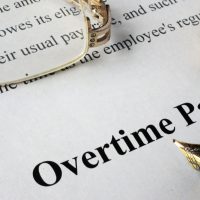Judge Rules that Obama Administration Changes to Overtime Laws Impermissible

A federal judge in Texas has ruled that the Obama administration exceeded its authority in changing the federal rule on which employees may be considered exempt or non-exempt. The rule, which had been on hold since November of 2016, is now widely considered dead.
The ruling came in a lawsuit brought by several states and business groups that objected to the rule. The federal Judge assigned to the case, Hon. Amos Mazzant, had already indicated that he felt that the new rule was a misinterpretation of the intent of Congress in enacting the original law when he put the change on hold. He has now issued an official opinion that the Obama-era rule should not be permitted to stand.
The Fair Labor Standards Act (“FLSA”) requires employers to pay covered, nonexempt employees not less than one and one -half times an employee’s regular rate of pay for any hours worked over 40 in a workweek. Workers will be considered exempt from overtime if they are paid more than $455 per week ($23,660 per year) and have a job that entails performing executive, administrative, or professional duties as defined by FLSA regulations. With certain exceptions, employees also must be paid on a “salary basis” which, per the U.S. Department of Labor, “means an employee regularly receives a predetermined amount of compensation each pay period on a weekly, or less frequent, basis” that is not reduced due to changes in the quality or quantity of worked performed.
Judge Mazzant based his decision on the fact that the minimum salary was set at too high a level. “This significant increase would essentially make an employee’s duties, functions or tasks irrelevant if the employee’s salary falls below the new minimum salary level,” he explained in his opinion. In other words, the new rule would have made many currently-exempt workers eligible for overtime, despite passing the duties test. This, the judge ruled, would negate the intent of Congress in creating the duties test.
In May of 2016, the Obama administration introduced the rule substantially increasing the minimum pay that an employee must receive in order to be classified as exempt from overtime pay. The new minimum salary under the overtime rule was raised to $47,476, more than doubling the existing minimum of $23,660. Business groups and many governors strongly objected to the change, arguing that it would force businesses to demote many employees and result in sharply increased labor costs. According to some estimates, the change would have made an additional 4.2 million American workers eligible for either overtime pay or a raise to the new minimum exempt salary.
The Trump administration has withdrawn its earlier appeal of the decision to place a hold on the rule, and is now reportedly considering alternatives to the Obama rule. The Department of Labor has requested comments on the existing overtime rule. Secretary of Labor R. Alexander Acosta has expressed interest in raising the salary threshold to a more modest amount, possibly near $32,000 per year.
If you’re an Illinois employer with questions about how shifting overtime rules or Department of Labor policies could affect your workers, contact the informed and seasoned Hoffman Estates employment attorneys at MacDonald, Lee & Senechalle for a consultation, at 847-310-0025, with additional offices in Des Plaines at 847-298-5030.
